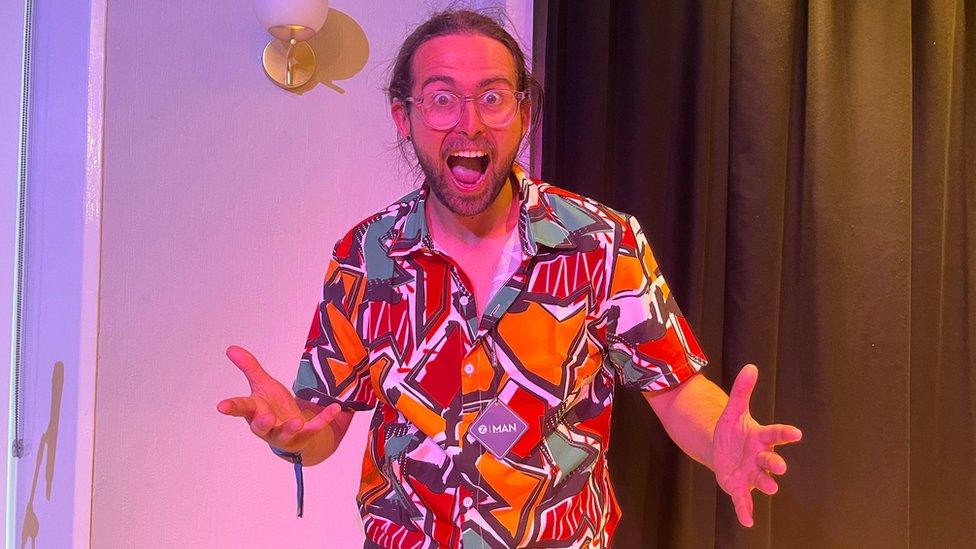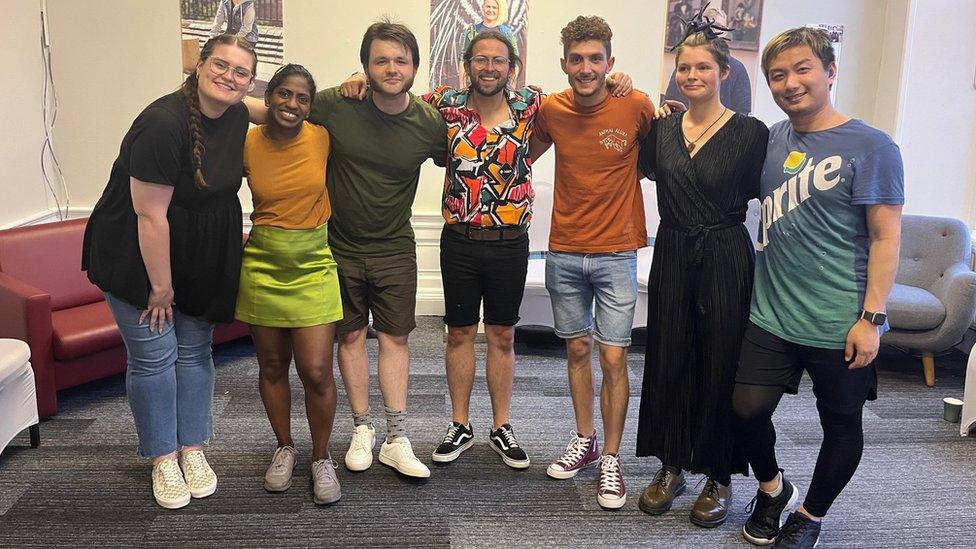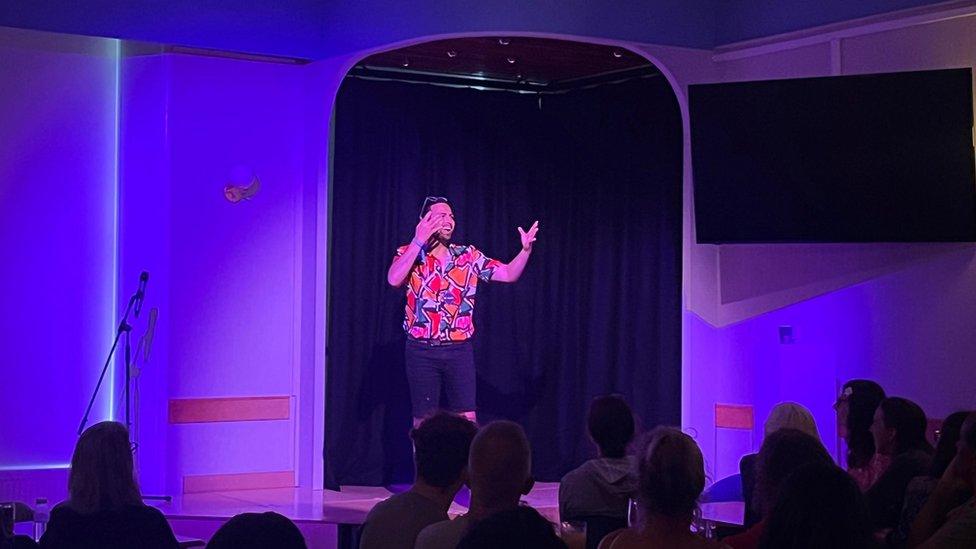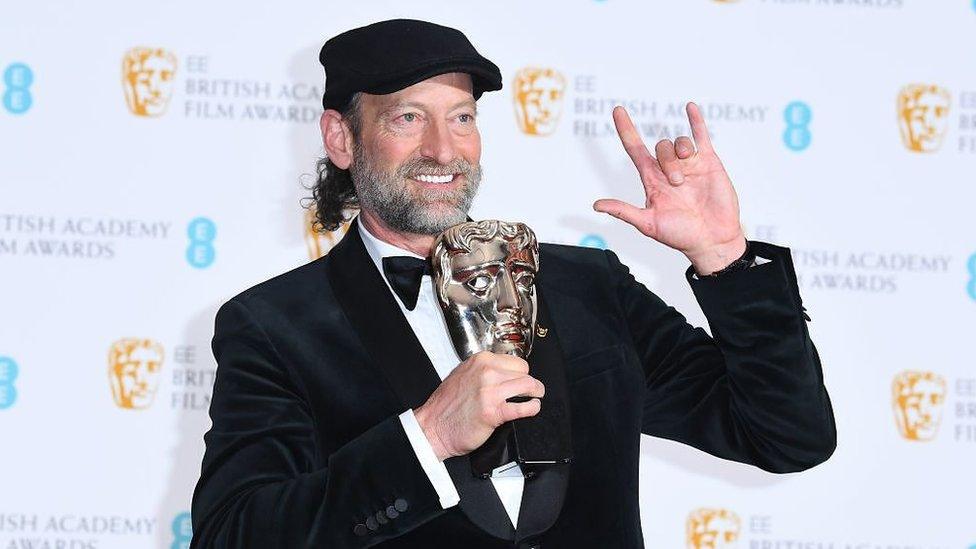Deaf stories don't have to be sad and patronising
- Published

Craig performed in "Spill Your Drink: a deaf cabaret" at the Edinburgh Deaf Festival
Craig McCulloch is an actor who says he is living his dream - and just happens to be deaf.
The 28-year-old wants to show young people they can follow in his footsteps and have the same opportunities he has had.
Craig, from Falkirk, says he loved attention from a young age and appeared in school plays before joining a deaf theatre group at the age of 16.
He then attended the Royal Conservatoire of Scotland and graduated in 2018 with a BA in Performance in BSL (British Sign Language) and English.
This year, he is performing in the very first Edinburgh Deaf Festival, external which showcases a range of deaf talent from actors to comedians.
It was set up by charity Deaf Action to increase the visibility of deaf artists for Edinburgh festival audiences.

The cast of the "Spill Your Drink" cabaret show performed for three nights of the Deaf Festival
Craig performed in "Spill Your Drink: a deaf cabaret" with Glasgow-based theatre company, Solar bear, who work with deaf and hearing actors.
The show, which features a range of performers from dancers to singers, was narrated by Craig using sign language.
His comedic commentary was translated from BSL to spoken English by an interpreter to make it accessible to all audience members.
Craig says the festival is important for deaf artists like him as it embraces deaf culture and allows mainstream audiences to learn more about them.
"I think that's really important for deaf audiences because we need more things, we're a minority," he says.
"We often don't have access to lots of things in the mainstream and it's a good opportunity for deaf artists to be in shows as well.
"I think it's powerful now to have an opportunity like this in this festival to educate the mainstream audiences, create greater awareness and make them realise that BSL is our language.
"We have a rich heritage, culture and history and I'm very proud of that and this is a good opportunity to showcase that."

In the future, Craig aspires to create theatre which can be seen by mainstream audiences
The past year has seen a number of high-profile deaf people on mainstream TV and film.
Troy Kotsur became the first deaf man to win an Oscar for his performance in CODA, which tells the story of the only hearing member of a deaf family.
On TV, EastEnders actress Rose Ayling-Ellis was the first deaf contestant on Strictly Come Dancing, and went on to win the series.
And Tasha Ghouri appeared on Love island wearing a cochlear implant, which can allow some deaf people to receive and process sounds and speech.
Craig says some people in the deaf community were critical of Love Island as her experiences did not compare to those of most people while CODA was told from the point of view of a hearing child.
But Craig believes any deaf representation in the mainstream media is very important.
'Better representation'
"I love people to see more deaf representation full stop because deaf people are not all the same, we're not a monolith," he says.
"There's a variety of deaf people, lots of deaf people have different experiences, lots of deaf people in the world, it's good for us to see variety.
"We're not all the same, we don't want to be a carbon copy of each other. I think that's the point when you're talking about better representation, that includes diversity."
Craig says stories should include all lived experiences of deaf people.
"It doesn't always have to be some sad, patronising story. I think we've had enough of that. It's time for them to see our culture, see our deaf people in deaf families," he says.
Deaf Action chief executive Philip Gerrard says it can sometimes be difficult for deaf people to get into mainstream settings so the festival provides a platform for people to have more opportunities.
"There are young people here, they now have role models who are on the stage so they can think 'oh, this is something I can do'," he says.
"That's really exciting to think about, they could be inspired by people to carry on doing that."
- Published26 March 2022
